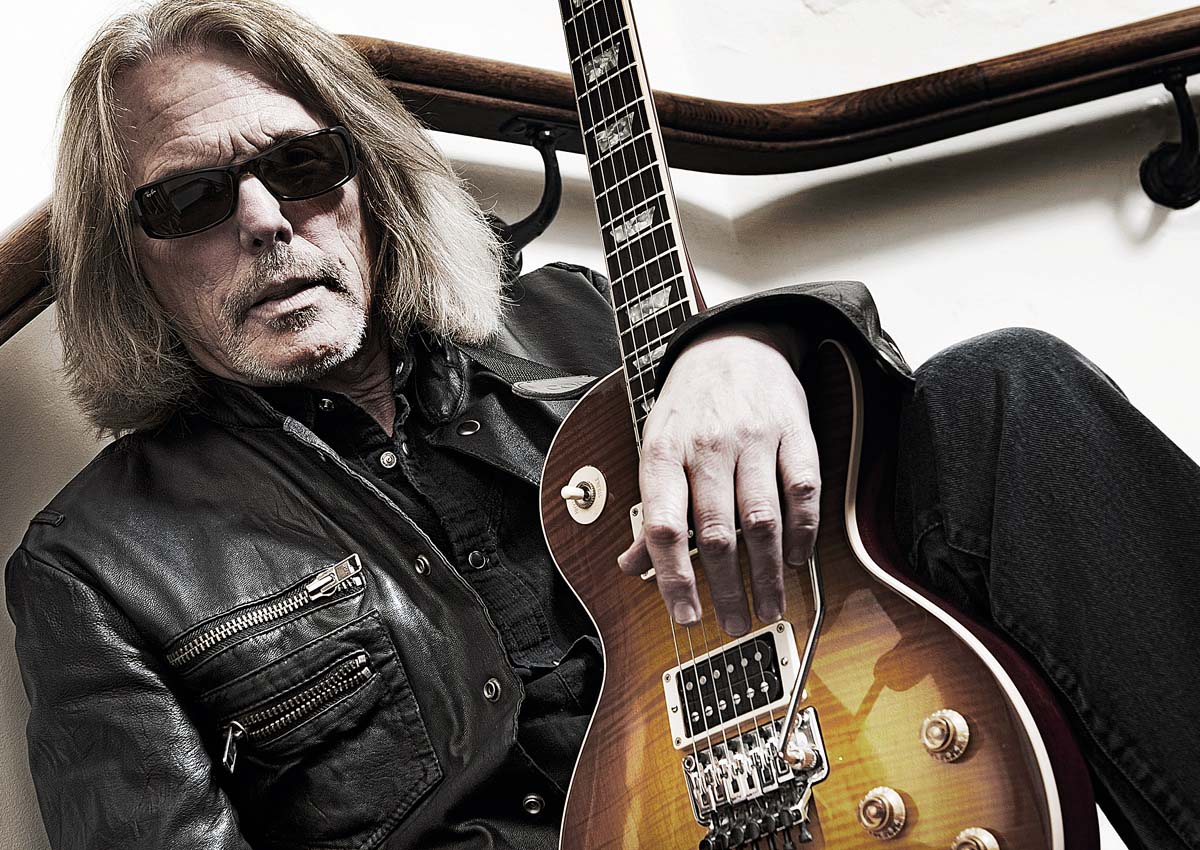Scott Gorham: “I’m not this real technical guy – I never had a lesson. Thin Lizzy was my school of rock“
The Black Star Riders and Thin Lizzy icon on a life spent at the sharp end of rock's greatest hits

He made his name in the 70s as part of Thin Lizzy’s fabled twin-guitar attack. Now, he carries the spirit of Lizzy in Black Star Riders.
Gorham’s licks and harmonies inspired Maiden and Metallica, and his tone is a rock benchmark. As he says: “If it don’t sound right, it ain’t right.”
Here, Gorham shares lessons learned over a half-century at the forefront of classic-rock guitar.
Get a groove first
“I never start writing with the actual riffs or harmonies or lyrics. For me, the start to a song is the groove itself. If I can make myself nod my head in time and make my foot tap I know I’m onto something.
“You need that base right off the bat so everybody can cling onto it and start adding their parts. I don’t have drum machines or anything in my office, so it’s all in my head.”
You don’t need to work face to face anymore
“For the latest Black Star Riders album, Another State of Grace, we couldn’t get together to write because we live so far apart. Christian (Martucci, guitarist) was on tour with Stone Sour, and he always carries around a recording system with him on the bus.
“He said, ‘Listen, why don’t all you guys send me your ideas, your riffs and your chord patterns, and while I’m out on the road I’ll try to glue these things together.’ I was like, ‘That’s not gonna fuckin’ work! We gotta be eyeballing each other.’ But I sent him over 10 ideas. I have to admit, he came back with some really cool ideas with all of our parts put together.”
Get The Pick Newsletter
All the latest guitar news, interviews, lessons, reviews, deals and more, direct to your inbox!
Don’t work with jerks
“I’ve got this mantra of ‘no assholes’, and no assholes get onto the same stage that I’m on. All these guys that I’ve played with are just great players with great personalities.
“When you talk about Thin Lizzy, they have a great respect for what they’re getting into, so make sure they get it absolutely right. I don’t think I’ve ever had to tell any of those guys, ‘Hey man, you’re playing that wrong.’ It wrecks the whole chemistry of everything on stage if you’re always worried about one guy.
“If they’re a total jerk but ‘oh my god can he play the hell out of his instrument,’ after a while that’s going to detract. You know at some point he’s probably gonna start giving up on the song. You have to be able to trust everybody up on the stage to do what they say they’re going to do.“
Don’t let your fears hold you back
“I try to have a sound of my own, but it comes out the way it comes out and you just hope to god somebody out there is going to like what you do. I think we all have these insecurities bubbling up underneath.
“You’re walking out on stage, you’re naked, and you’re not quite sure if the audience is there for you or for somebody else. Our whole thing in Thin Lizzy was never ever give up, because you never know who’s out in the audience.
“You might be influencing somebody else to get up there and do what you’re doing because it looks like a lot of fun. But you’re always aware that at some point you could mess the song up and all fingers are going to point at you.“
Get a light guitar and save your back
“I’m using a Les Paul Axcess now. It’s got the vibrato arm which I got really used to having because I played Strats for about 10 years, and my style altered quite a bit. The other big difference between this Les Paul and the ones back in the 70s is the weight. It’s a thinner guitar and it’s so much lighter.
“I was starting to get a pretty bad back and when I got that Axcess the relief was unbelievable. From that point on I got all my guitars chambered. There’s no way I would swing 30 pounds around my neck for two hours a night anymore.
“I tried one of Zakk Wylde’s guitars. It must have weighed like 50 pounds and he’s got that strap with the spikes on it that adds another 20 pounds. I’m thinking ‘Shit man, how does this guy wheel this guitar around for two hours?’ Unbelievable.“
Stompboxes changed the game
“People say, ‘Isn’t it the density of the wood that gives you the sound?’ But like Billy Gibbons says, the wood doesn’t make any difference these days. Back in the 70s, we had no stompboxes, but now there are stompboxes for days and we can get any kind of sound we want. You don’t even take the density of the wood into consideration any longer, unless you’re a jazz guitarist or your main instrument is an acoustic guitar.“
Find the right guitar for you
“I started off in Lizzy with this really shitty Les Paul copy that didn’t even have a brand on it. Phil Lynott went ‘guitar’ and I immediately went straight for a Les Paul Standard. I looked over at Phil and he went, ‘no, I don’t think so.’ Eventually I went to the little Les Paul Deluxe stand, and he said ‘yeah man, now that’s cool!’
“It was all to do with price, because we just didn’t have enough money at that point for the Les Paul Standard. I got as much out of that as I possibly could for my talent at that point but as soon as we started to make money I was onto bigger and better things.“
You get what you pay for
“I bought this 1957 Les Paul in Boston. We were at a soundcheck and the security guy knew this vintage guitar dealer who came to a lot of the shows. They had six guitars with them all in their flight cases, flipped the lids and my eye immediately went to this 1957.
“He told me it was a ’59 which didn’t make any difference to me, it was all down to the feel and the sound. I picked this guitar up and absolutely just fell in love with it. After we played a song, Phil said, ‘yeah man, that sounds great.’ Pete, our sound guy just said two words: ‘buy it.’ So the dealer looked at me as if to say ‘well, there’s no negotiating on the price now!’ It was $2,300 at the time.“
Master volumes save your ears
“We were doing this tour with Deep Purple, and Steve Morse was sponsored by Engl. His tech worked for Engl. Every soundcheck the tech stood right with me and says, ‘Hey, you’re sure you don’t want to try the Engl?’ I’m like, ‘no really, I’m good.’ One night a tech somehow blew up all four of my Marshalls.
“The Engl guy’s going, ‘Well, should we throw an Engl up there?’ I kind of had no choice now, but it sounded great right out of the right out of the cellophane. I ended up getting endorsed by Engl for 10 years or something. Then I had a jam session somewhere with Marshalls up there.
“I fell in love with Marshalls all over again. I prefer the new Marshalls to the old ones because of the master volume. You can get that sound without blowing the audience’s heads off. In the old days, you’d be up to nine on the amplifier, but now it’s like two and a half or three and you’re still getting the sound. I love the Marshall cabs too, with the 25-watt Greenback Celestion speakers. You just can’t beat it.“

Find a guitar tech you can trust
“Casey is my guitar tech. He’s a young kid, a really good player, and he knows exactly what I want every night, pedal-wise, sound-wise, volume-wise. Even if there’s no official soundcheck, he’ll get out there and he'll make sure that he gets you know some sort of sound check out of those things, make sure everything’s coming through my monitors really pristine.
You’re not going to get a whole lot out of me about the details of my rig – I haven’t seen my pedalboard for over a year now!“
Develop your own style
“It’s always a learning process every time you go up on stage. Hopefully you’re gonna start learning things from different guys who are on stage. They’re gonna do something that makes you say, ‘Holy crap I didn’t even think about that! Hey man, how do you how do you do that?’ or you just eyeball the neck and see how they’re doing it.
I don’t think I’ve ever stolen anything from anybody. What I’ll do is take a hint of what they’re doing and apply it to my own style. I think that’s important
“I don’t think I’ve ever stolen anything from anybody. What I’ll do is take a hint of what they’re doing and apply it to my own style. I think that’s important. If somebody wants to play like me, my advice would be: don’t do it. Maybe take a couple of tips from my playing. Take a lot of tips from everybody. But don’t flat out try to copy anybody.“
Find musicians who will push you to improve
“I’m not this real technical guy. I never had a lesson. When I got in the band with Brian Robertson, his father was the second saxophonist with the Art Blakey jazz band and his mother was a piano teacher. He knew all the scales and the names of everything.
The first couple of years of Thin Lizzy were my school of rock. Everybody that went through that band did the same thing – everybody walked out a better player. It was kind of demanded of you. There was always a lot of pressure to be better, larger, louder...“
- Black Star Riders' Another State of Grace is out now via Nuclear Blast.
“His songs are timeless, you can’t tell if they were written in the 1400s or now”: Michael Hurley, guitarist and singer/songwriter known as the ‘Godfather of freak folk,’ dies at 83
“The future is pretty bright”: Norman's Rare Guitars has unearthed another future blues great – and the 15-year-old guitar star has already jammed with Michael Lemmo









